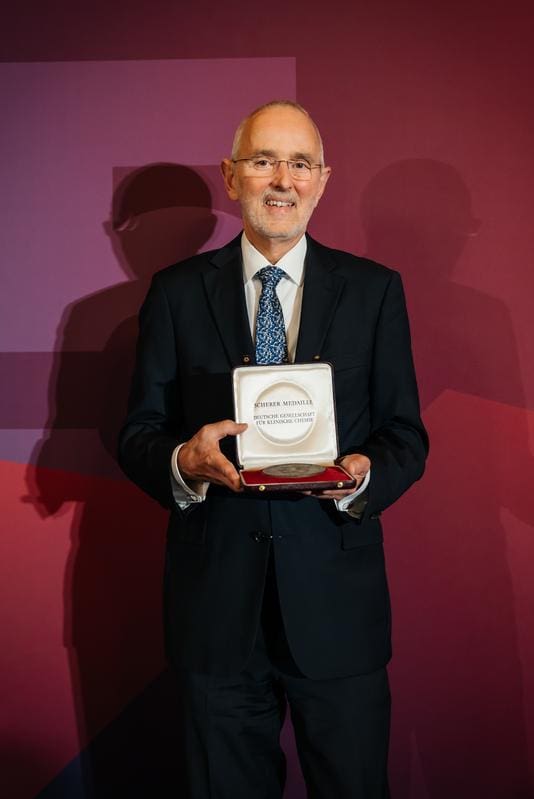Scherer Medal 2025 goes to Prof. Klaus P. Kohse
The German Society for Clinical Chemistry and Laboratory Medicine (DGKL) has honored Prof. Dr. med. Dr. rer. nat. Klaus Peter Kohse was honoured with the Scherer Medal. This highest award of the professional society honors his life’s work and his outstanding services to science and the further development of laboratory medicine.
The award by the acting DGKL President, Prof. Dr. Harald Renz, underlines the immense appreciation for Kohse’s life’s work. The professional society honors him as a brilliant scientist, tireless designer and important mentor of the field. His decades of commitment at national and international level have had a lasting impact on laboratory medicine. The DGKL considers it a special honour to bestow this well-deserved recognition on this highly esteemed member at the end of his impressive active career.

Professor Klaus P. Kohse is a clinical chemist and specialist in laboratory medicine with an impressive career. After completing his doctorate in the natural sciences in Bochum and his medical doctorate in Stuttgart and T├╝bingen, he completed his further training under Professor Herrmann Wisser in Stuttgart and Ulm. A formative research stay as a postdoctoral fellow at Stanford University Medical School in the laboratory of Nobel laureate Ferid Murad underlines his scientific achievements.
In 1992, he moved to Oldenburg, where he worked as Director of the Institute for Laboratory Diagnostics and Microbiology at the Oldenburg Clinic until 2020 and also held the office of Medical Director for a time. Shortly after the founding of the Faculty of Medicine and Health Sciences at the Carl von Ossietzky University of Oldenburg, he was appointed Professor of Clinical Chemistry and Pathobiochemistry there in 2013 and, as interim Dean of Studies, played a key role in shaping the development of medical education.
His research interests are remarkable, ranging from muscle biochemistry, immunoassay development, and carnitine metabolism in kidney disease, adrenergic receptors, cardiac natriuretic peptides, and groundbreaking work on reference intervals in pediatric laboratory medicine.
His commitment to the professional societies is extraordinary. A member of the DGKC since 1983 and of the DGLM since 1995, he was active long before the merger into the DGKL. He held numerous offices in the DGKL, including as a member of the presidium and secretary. He was involved as a speaker at the revision course and member of the examination board for clinical chemists and was congress president of the DKLM in Oldenburg in 2017. He also contributed his expertise internationally as treasurer of the European Federation of Clinical Chemistry and Laboratory Medicine (EFLM) and as a representative of the DGKL in the International Federation of Clinical Chemistry and Laboratory Medicine (IFCC). His work as a proficiency test leader for clinical chemistry, appointed by the German Medical Association, and as a consultant to the Reference Institute for Bioanalytics (RfB) round off his comprehensive profile. Nevertheless, his commitment to the subject of laboratory medicine can hardly be described in its entirety.
About the Scherer Medal
The Scherer Medal is the highest award of the DGKL. It is awarded by the Executive Board to experts who have distinguished themselves through their outstanding achievements in science and the promotion of clinical chemistry. It is named after the renowned privy councillor Professor Dr. Johann Joseph von Scherer (1814ŌĆō1869), who is considered a pioneer in the field of clinical chemistry. As a physician and professor of organic chemistry at the medical faculty of the University of W├╝rzburg, he researched the connection between chemistry and medical practice throughout his life.
Editor: X-Press Journalistenb├╝ro GbR
Gender Notice. The personal designations used in this text always refer equally to female, male and diverse persons. Double/triple naming and gendered designations are used for better readability. ected.




